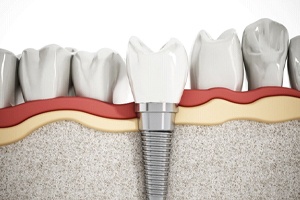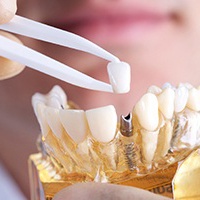
Dental Implants — Northborough, MA
The Best Tooth Replacement Solution

Modern dentistry offers several ways to replace missing teeth. Among these, dental implants are the only one that rebuilds lost teeth from the roots up. This remarkable treatment can address any level of tooth loss, and its results have the potential to last a lifetime. At Northborough Dental Associates, we are proud to offer comprehensive dental implant services. If you have lost one or more teeth, we invite you to schedule a consultation to learn more about replacing missing teeth with dental implants in Northborough, MA.
Why Choose Northborough Dental Associates For Dental Implants?
- Advanced Dental Implant Technology for Precise, Lasting Results
- Start-to-Finish Dental Implant Treatment in One Location
- Financing & Essential Dental Plan Available to Make Treatment Affordable
What Are Dental Implants?

A dental implant is a small titanium cylinder or post that can be topped with one or more replacement teeth. Once a dental implant is inserted into the jawbone, it bonds with the surrounding bone tissue. Not only does this provide a strong and reliable foundation for the new teeth, but it essentially replaces the roots of the missing tooth as well. This important feature is what sets dental implants apart from other options like dentures and dental bridges. Restoring the root structure of a missing tooth is the only way to prevent jawbone deterioration and achieve a truly lifelike replacement. With dental implants, you can truly regain a smile that looks, feels, and functions just like natural.
The 4 Step Dental Implant Process

The process for dental implants takes several months — that may seem like a long time, but the end results are well worth it! Here are Northborough Dental Associates, we are able to handle every stage of the treatment right here in our office. Exactly how dental implants work in Northborough varies from case to case, but most patients must go through the following four steps: consultation, implant placement surgery, osseointegration and abutment placement, and restoration.
Initial Dental Implant Consultation

During your consultation, your implant dentist in Northborough will thoroughly examine your mouth and learn about your medical history. They will also answer any questions that you may have about the road ahead. We may use our advanced technology to scan your mouth and gain an understanding of your jawbone’s structure. If it looks like dental implants are a fit for you, you will be scheduled for your placement surgery. If you require some preliminary treatments before your mouth can support dental implants, such as gum disease therapy or extractions, your dentist will start to plan for those.
Dental Implant Surgery

Most dental offices must refer patients to an outside specialist for at least a portion of the implant procedure, particularly the implant placement surgery. Here at Northborough Dental Associates, however, we have the skills, experience, and equipment necessary to perform this service right here in our office.
During your appointment, we will numb your mouth and may sedate you. We will create incisions in your gums, insert the implants, and close the incisions. You should feel little to nothing while we are working. Most patients are able to return to work within a day or two of their surgery.
Dental Implant Osseointegration & Abutment Placement

Osseointegration is the biological process through which your jawbone will bond with your dental implants in Northborough. It is what enables the implants to remain secure in the mouth for decades. Osseointegration typically takes at least a few months.
Following osseointegration, you may undergo a second minor surgery. The tops of your implants will be exposed, and healing caps will be placed on them. After your gums recover, you may receive abutments (small connector pieces that will keep your restorations in place). Some patients receive abutments at the same time as their initial implant surgery.
Delivery of Dental Implant Restorations

Restoration is the process of designing and placing the crown, bridge, or denture that will replace the visible portion of your lost teeth. We will use detailed impressions of your mouth to design your restoration. We will also pay careful attention to aesthetics, making efforts to ensure that your new teeth look as natural as possible.
After a laboratory fabricates your restoration, we will verify its fit before we attach it to your implants. You should be able to start eating with your new teeth right away, but you might want to start with soft foods while you are adjusting to how they feel in your mouth.
Benefits of Dental Implants

Hundreds of thousands of dental implants are placed in the U.S. each year. The blossoming popularity of this treatment is easy to understand when you consider all the benefits of dental implants in Northborough. They are the gold standard of tooth replacement! They have the potential to improve your day-to-day life and your health. They also offer some significant long-term benefits. Read on to learn more about some of the most popular benefits our patients love about dental implants!
Day-to-Day Benefits

Did you know that about one-third of denture wearers believe that dentures limit their ability to live life to the fullest? If you can relate to them, dental implants in Northborough may be right for you. They are also an excellent alternative to dental bridges and partial dentures! After your new teeth are in place, you can expect to enjoy a number of advantages, including:
- Freedom to eat what you enjoy. Dental implants are quite sturdy, which means they are unlikely to become destabilized even if you are consuming relatively tough foods.
- Improved confidence. The natural appearance of dental implants may make it easier for you to smile in social situations.
- Clear speech. The comfortable, custom fit of implant restorations can help you speak with clarity and power. Also, because implants do not slip in the mouth like traditional dentures, you will not have to worry about embarrassing “oops” moments when you are speaking with friends, coworkers, or clients.
- Easy maintenance. In many ways, caring for dental implants is similar to caring for natural teeth. Thorough oral hygiene and regular dental visits are both key.
Health Benefits

Tooth loss is associated with an increased risk of several serious health problems. It may even have an impact on an individual’s lifespan. Dental implants are the next best thing to natural teeth, so it is reasonable to think that they can mitigate such risks to a degree. Some of their other health benefits include:
- Jawbone preservation. After you lose a natural tooth, the bone that once supported it begins to deteriorate. Over time, that deterioration can affect facial shape. Dental implants act as substitute tooth roots and can help to keep your jawbone strong, healthy, and whole.
- No damage to nearby teeth. Placing a traditional bridge requires that the teeth beneath the prosthetic (the abutment teeth) be filed down in order to fit beneath their crowns. Dental implants are self-supporting, so they do not usually require that any of the remaining natural teeth be modified.
- No dental drift. Following tooth loss, the remaining natural teeth may drift out of place, leading to a misaligned bite and a risk of further tooth loss. Implants are placeholders and can help to keep all of your teeth where they belong.
Long-Term Benefits

With proper care, it is possible for dental implants to last a lifetime. That makes them an excellent monetary value, especially when you consider the fact that other forms of tooth replacement, such as traditional dentures, have to be replaced every few years. The restorations on top of dental implants also have a long life expectancy.
Are you interested in finding out how dental implants may benefit you personally? Your implant dentist in Northborough is ready to help!
Who Dental Implants Can Help

Dental implants in Northborough are one of the most versatile tooth replacement options available. Whether you are missing one tooth, a few teeth, or all of your teeth, they may be able to provide you with a sturdy and strong smile that stands the test of time. Of course, you will have to meet a few basic oral and overall health criteria before we are able to approve you for implants. Most adults do qualify for them!
Who Is a Good Candidate for Dental Implants?

In general, good candidates for dental implants:
- Have fair overall health. You should be free of any serious medical problems that could interfere with your implants’ success.
- Have good oral health. If you have gum disease or other significant oral health issues, they will need to be treated before you can get dental implants.
- Have adequate jawbone density and size. Your jaw must be large enough and strong enough to integrate well with your implants.
If you do not qualify for implants right away, you may do so after some preliminary treatments. The vast majority of patients can take advantage of this form of tooth replacement.
Missing 1 Tooth

If you are missing just one tooth, we will insert a single dental implant into the jawbone. After it fuses with the tissue around it over a period of a few months, we will place a custom crown on top of it. In most cases, an implant-supported crown is a preferable alternative to a traditional dental bridge. That is because traditional bridges require that the nearby teeth be significantly filed down to support the restoration. An implant is self-supporting, so nearby teeth can usually remain intact. Plus, implants tend to look, feel, and function just like natural teeth.
Missing Multiple Teeth

Keep current image
If your missing teeth are all adjacent to one another, we will likely recommend an implant-supported bridge as the best treatment for you. This type of prosthetic has a similar structure to a traditional bridge, but it is supported by implants rather than by the remaining natural teeth. A bridge with two implants can typically replace up to five teeth.
If your missing teeth are not consecutive, we may have to consider other implant options. You might qualify for a partial denture that will be anchored in place by just a few dental implants. It is also possible that we could place a few separate single-implant crowns.
Missing All Teeth

If you require full-arch replacement, your dental implant dentist in Northborough will place a few dental implants at strategic locations throughout your jawbone. The exact number of implants needed varies from case to case. It may be as few as two or as many as six or more. Sometime after the implants are placed, you will receive either an overdenture (a removable prosthetic that snaps onto the implants) or a permanent implant denture. Many people who have had traditional dentures in the past choose to upgrade to implant dentures, and they could not be happier with their decision because implants provide such remarkable stability and functionality.
Understanding the Cost of Dental Implants

The cost of dental implants varies from person to person and depends on quite a few different factors. When you visit us for your consultation, we will provide you with an estimate for the cost of each stage of your treatment so you can accurately assess whether there is room in your budget for dental implants in Northborough. Although the price may seem high at first, we strongly encourage patients to make the investment in dental implants. The many benefits they offer make them well worth the cost, and in many cases, dental implants will end up paying for themselves over time.
Preliminary Treatments & Dental Implant Surgery

It is common for patients to require some preliminary treatments, such as a bone graft or extractions, before they can receive dental implants. Each of these services incurs its own fee. The dental implant placement surgery also has its own cost, which depends on how many implants are being placed. We are able to handle the placement surgery in-house, so you will not have to worry about dealing with the pricing policies of another practice during this portion of your treatment journey.
The Parts of Your Dental Implant

There are several different types of dental implants and dental implant treatments. Logically, a single implant costs less than full mouth replacement. There are also different types of full mouth replacement options, including basic overdentures and permanently fixed full-arch bridges. If more than one type of implant treatment would be suitable for your situation, we will help you understand the pros, cons, and cost of each option before you decide how to move forward.
The Final Dental Implant Restoration

Dental implant restorations are constructed out of high-quality materials that mimic the look and feel of natural teeth. If you just need one implant-supported crown to replace a single tooth, you will pay less than if you need a full denture. A bridge that replaces two or three teeth will obviously have a different price. Our team will work with you to ensure that you are getting a beautiful restoration that fits your needs.
Does My Dental Insurance Cover Dental Implants?

It is becoming more common for dental insurance to cover the cost of dental implants in Northborough. However, there are still quite a few policies that do not cover the treatment. Our team will help you understand how your benefits apply and how you can get the most out of your insurance plan. Even if your insurance does not cover the implants themselves, it may cover other parts of your treatment, such as your preliminary procedures or your final restoration.
Making Dental Implants Affordable

As your implant dentist in Northborough, our team wants to help you afford your treatment. That is why, in addition to helping you with insurance, we offer a few provisions that may enable you to get the treatment you want and need:
- CareCredit Dental Financing: Most patients qualify for CareCredit, a third-party lender that offers low-interest payment plans for medical and dental treatments.
- Essential Dental Plan: This membership plan provides you with a discount on most services provided in our office. It is designed to help patients without insurance.
Maintaining & Caring for Your Dental Implants

Your dental implants have the potential to provide you with a lifetime of strong, healthy, and attractive smiles. However, they will only fulfill that potential if you take some simple steps to protect them from infection and damage. Below, you will find practical guidance on proper dental implant care in Northborough.
Make Oral Hygiene a Priority

Oral hygiene is one of the best ways to reduce the risk of infection in the tissues around your implants. To maintain a clean mouth, you should:
- Brush your teeth at least twice a day, making sure to clean the area along the gumline.
- Floss thoroughly once a day. String floss is usually better than a water flosser or floss pick.
- Follow hygiene instructions that are specific to your restoration. For example, you might need to remove your denture for proper cleaning.
Eat a Healthy Diet

Dental implants are durable enough to stand up to a wide variety of foods, so feel free to eat all of your favorite meals and snacks. However, keep in mind that it would be unwise to overindulge in anything that is sugary, acidic, hard, or sticky. Such foods may increase the risk of damage and infection around your implants. Try to eat a balanced diet that is rich in nutrients that support oral health.
Break Bad Habits

Some bad habits that could damage your implants and increase the risk that they will fail include:
- Smoking (or using any other type of tobacco product)
- Chewing on hard objects
- Using your teeth as a tool
Every effort you make to quit such habits will be worth it! If you need help to stop smoking, your primary care practitioner or another medical professional may be able to offer some valuable advice.
Protect Your Dental Implants

Do you like to play sports? It is important that you wear a mouthguard. A generic mouthguard can provide some protection, but a custom one from a dentist will prove to be more comfortable and more effective.
You might also need a nightguard while you sleep, particularly if you are prone to grind and clench your teeth. The nightguard will place a barrier between your upper and lower teeth and stop them from harming one another.
Schedule Regular Dental Checkups

You should visit your implant dentist in Northborough at least once every 6 months for a cleaning and checkup. At these routine appointments, we will examine your mouth, clean your teeth, and perhaps remove your restorations so we can clean your abutments. If your checkup reveals any signs of a developing problem, we may be able to address the issue before it poses a serious threat to your implants or your oral health.
Dental Implant Post-Op Instructions

After your dental implant placement surgery, you will have to go through a recovery period. But do not worry — most patients experience no significant difficulties while they are on the mend. Below, you will find some practical dental implant post-op instructions in Northborough that will help you stay as comfortable and healthy as possible while your mouth heals.
What to Do Directly After Dental Implant Surgery

After your surgery, blood clots should form at your dental implant sites. These clots are an important part of the healing process, so you should be careful not to accidentally dislodge them. You can protect them by:
- Not spitting. Instead, use tissue to absorb excess saliva or simply swallow it.
- Avoiding the use of drinking straws. The suction action is dangerous for the blood clots.
- Avoiding smoking. Smoking slows down healing, and the act of forcefully inhaling could disturb the blood clot.
- Resisting any temptation to touch your surgical sites. It is best not to touch your implant sites with either your tongue or your fingers.
Common Side Effects

Some side effects are to be expected after you receive dental implants. You might experience the following:
- Intermittent bleeding. This can go on for several days. It is usually manageable with gauze and light pressure.
- This can go on for a week or longer. Cold compresses may help to minimize it.
- General discomfort. Getting plenty of rest and taking pain medications can keep this to a minimum.
If you experience any prolonged or severe side effects, contact your dental implant dentist in Northborough right away.
Diet

At first, you should stick to a no-chew diet, which can include things like applesauce, pudding, yogurt, and brothy soups. Later, you can progress to fork tender foods, including pasta, meatloaf, and non-crusty breads. Once you feel up to it, you may be able to resume fairly normal eating habits, although it would be wise to be cautious with anything that is hard, crunchy, or sticky.
Health & Oral Hygiene

It is okay to brush and floss the day after surgery, but you must be careful around your surgical sites. Rinsing with warm saltwater can help manage inflammation and fight bacterial buildup. If you have a prescription mouthwash, be sure to use it as directed. If you choose to use a nonprescription mouthwash, try to avoid products with a high alcohol content.
What to Do After Your New Teeth Are Attached

Once your restoration is attached to your dental implants in Northborough, you might experience some gum sensitivity and excess saliva production at first. However, there will be no downtime or lengthy recovery period. You can start using your new teeth right away, but it would be wise to eat relatively soft foods at first.
Dental Implant Failure & Salvage

Dental implants are a consistently successful treatment; they thrive in more than 95% of cases. However, there is always the small possibility that you will face dental implant failure. If you ever believe that something is amiss with your restored teeth, contact us right away. We will evaluate the problem, recommend a treatment, and do everything we can to preserve your smile so you can continue enjoying the many benefits of dental implants.
Dental Implant FAQs

Our team is ready to help you take advantage of the many benefits offered by dental implants in Northborough! Before you schedule your consultation with us, however, it is understandable if you have some questions about the road ahead. That is why we have compiled the following brief list of FAQs, along with their answers. If you do not see the information you were hoping for, please call us. We will be happy to personally assist you.
How Long Do Dental Implants Last?
For the majority of patients, their dental implants are still thriving 10 years after placement, and many people get to enjoy their implants for an entire lifetime! The restorations on top of dental implants also have a long life expectancy; they typically last for a decade or longer. You can help your new teeth to stand the test of time by adhering to a strict oral hygiene routine, avoiding the use of cigarettes, and visiting your implant dentist in Northborough for regular checkups and cleanings.
What Should I Do if My Dental Implant Feels Loose?
A loose dental implant is a reason to call our practice to schedule an appointment as soon as possible. The problem may be with the implant’s restoration, meaning that you need a new crown, bridge, or denture. However, the issue could also be related to the implant itself. You might even be in danger of experiencing dental implant failure. The sooner you seek treatment, the more likely it is that we will be able to preserve your new teeth and solve the problem without any extensive or complex procedures.
How Long Does It Take to Recover from Dental Implant Surgery?
Most patients are feeling well enough to return to work the day after their surgery. However, you might want to take a bit of extra time off if your job involves a lot of physical activity. Strenuous exertion might slow down your body’s healing process. You may experience a bit of swelling and bleeding for several days, after which your mouth should gradually return to feeling normal. Although you can expect your gums to heal fairly quickly, it will take longer for your bone to recover. It may take up to six months for the implant to bond with your jaw.
Can I Get Dental Implants if I Smoke?
Smoking does not automatically disqualify you from getting dental implants. We determine candidacy for the procedure on a case-by-case basis, and we do so by considering numerous oral and overall health factors. However, it is important to keep in mind that smoking drastically increases the risk of dental implant failure. It heightens the chances of infection and slows down the body’s healing processes. At the very least, you should abstain from smoking during the weeks and month before and after your implant surgery. Of course, it would be ideal if you decide to kick the habit for good.